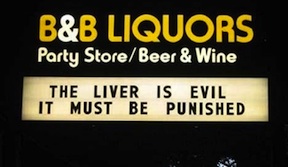Wine, Beer, Spirits and God in Georgia
 A "Blue Law" is a local civil law meant to enforce religious standards and principles. In the United States the most common form of the Blue Law is a legal prohibition on the sale of alcohol on Sunday, the Christian Sabbath. One usually finds such laws in the region of the U.S. called the Bible Belt…like Georgia.
A "Blue Law" is a local civil law meant to enforce religious standards and principles. In the United States the most common form of the Blue Law is a legal prohibition on the sale of alcohol on Sunday, the Christian Sabbath. One usually finds such laws in the region of the U.S. called the Bible Belt…like Georgia.
On November 8th more than 101 Georgia Municipalities will vote to determine whether to keep in place primarily one type of blue law common throughout these various municipalities: prohibition on buying alcohol at retail on Sunday.
It should be no surprise that in general Christian institutions oppose allowing citizens to buy a bottle of wine on Sunday. In some way, Christian institutions find this prohibition somehow supporting their view of the desires of their God. What's interesting, however is where the other opposition comes from: Liquor Store Owners.
Georgia was one of only three states including CT and IN that prohibited the retail sale of alcohol on Sundays. However, by-the-drink sales have been allowed. Things changed when the GA legislature passed a law allowing local municipalities and counties to hold elections concerning the right to buy alcohol at retail on sundays. 101 mainly cities (including Atlanta) and some counties have taken the opportunity and will hold elections on November 8.
Liquor store owners are arguing that people have become accustomed to buying their alcohol on Saturday, making Sunday sales unnecessary. In addition, they argue, they are not staffed appropriately to open their stores on Sunday, yet economics and competitive realities will likely demand they do in order to compete with grocery stores that will also begin selling wine and beer on Sundays if the initiative passes.Spirits may not be sold in grocery stores.
I understand the desire to not work on Sundays, let alone weekends. That's one of the reasons I'm not in retail. But what's interesting is that the state law that allowed these Blue Law repeal initiatives to ge on the ballot in Georgia had been stopped primarily by religious interests for many years. Now, in the midst of a recession, the law changes to let municipalities to vote on whether to have Sunday sales. In my mind this is progress.
Not being much of a religious person, the notion of saving the Sabbath for contemplation of God and faith doesn't make much sense to me. However, I'm a big fan of folks using Sundays for just this purpose if they desire. And as far as I can tell, none of the ballot initiatives force Georgians to buy beer, wine or spirits on Sunday. Furthermore, nothing in these laws will force liquor stores to open on Sunday. The question that is being answered in 101 Georgian locales is whether Georgians ought to be forced to support religion?

Only 3 states? Minnesota prohibits alcohol sales on Sunday (although I think grocery stores and gas stations can still sell the 3.2 beer and similar low-alcohol beverages). A bill was introduced this year to remove that restriction, and there was a similar opposition from liquor stores. It didn’t pass. Maybe Georgia will have more common sense.
Banning alcohol sales on Sunday is in direct violation of the establishment clause of the First Amendment, and by extension the 14th amendment on a state level. I know these “Blue” laws exist on the books, but the only argument for them is a religious one, and thus have no place in U.S. law.
Richard:
I don’t think these laws are in violation of the Constitution’s 1st Amendment nor its 14th. However, the laws do serve primarily to prop up religious standards.
Tom,
You are correct. Just because a law has a religious provenance does not mean it runs afoul of the Constitution. As a former CT resident, however, there is nothing worse than being halfway through an NFL game and realizing the beer won’t last.
Tom and James, you give no actual basis for your alternative interpretation of the 1st amendment. By banning sales on Sunday these government bodies are recognizing the establishment of a religion by abiding by Christian practices, as that is the only argument for a Sunday, rather than a Tuesday ban. Granted, many disagree with my interpretation, but if so, state why.
Richard:
The blue laws neither establish a state religion, nor do they prohibit the practice of religion.
By banning alcohol sales on Sunday, this establishes a state-sanctioned Christian law. You obviously don’t agree with this interpretation, but others do.
Richard,
See the Supreme Court Case, McGowan V. Maryland:
http://en.wikipedia.org/wiki/McGowan_v._Maryland
Richard,
You’ve convinced me… “Thou shalt not kill” has hampered our society long enough! I’m going to kill the next guy that cuts me off and seek constitutional protection. Wish me luck.
Tom, the supreme court also issued the Dred Scott decision…
James, you’re right, because Christians have killed no one since those commandments were issued.
Richard,
Last I checked the commandments were given to the Jews.
If you were a regular reader of Tom’s blog, you would realize that when Tom and I agree, it means with 99.99 percent certitude that we are correct.
Wait one minute…..James and I agree? So that’s what that flying pig was all about!
That makes sense to me and I’ve seen similar coetmnms elsewhere since. Again we’re talking about light to moderate alcohol consumption in people without an alcohol problem.Peter